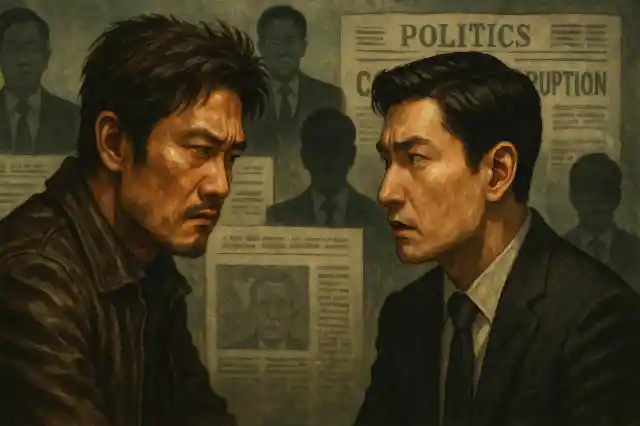Exploring the Dark Side of Power: “Inside Men” and Its Impact on Korean Cinema
How “Inside Men” Exposes Corruption and Power Struggles in Modern Korea
Have you ever wondered just how deep the roots of corruption go in society—or what happens when those in power are finally challenged? Watching a film like Inside Men can feel uncomfortably close to reality, especially if you’ve ever felt frustrated by the seemingly untouchable elite. This gripping movie doesn’t just entertain; it invites us to confront the uncomfortable truths behind political and business alliances, and the cost of seeking justice in a world where power seems to trump morality. If you’re drawn to stories that peel back the layers of society and reveal what’s lurking beneath, you’ll find Inside Men both thrilling and thought-provoking. Let’s dive into why this film has struck such a chord with audiences—and what it says about the world we live in.
- Inside Men is a critically acclaimed Korean film that boldly explores political and business corruption.
- The story centers on a political fixer, a prosecutor, and a powerful media figure, each representing different facets of power and justice.
- The film’s gritty realism and complex characters have made it one of Korea’s highest-grossing R-rated movies.
- Its success reflects a growing public appetite for stories that challenge societal norms and demand accountability.
- Plans for a drama series adaptation signal the film’s lasting impact on Korean media and social commentary.
Table of Contents
- Introduction: A Gritty Glimpse into Power
- Corruption and Power Struggles: Key Themes and Plot
- Key Characters and Their Roles
- Impact and Reception
- Future Developments: Beyond the Film
- Conclusion: What Does “Inside Men” Reveal About Us?
Introduction: A Gritty Glimpse into Power
Inside Men (내부자들), directed by Woo Min-ho and based on Yoon Tae-ho’s webtoon, is a 2015 South Korean crime thriller that pulls no punches in its portrayal of corruption at the highest levels. With a star cast led by Lee Byung-hun, Cho Seung-woo, and Baek Yoon-sik, the film weaves a tense narrative of revenge, ambition, and the dark bargains struck behind closed doors. Set against the backdrop of a society grappling with political scandals, Inside Men offers a mirror to the anxieties and frustrations of ordinary Koreans, making it both timely and timeless.
Inside Men on Wikipedia
Corruption and Power Struggles: Key Themes and Plot
At its core, Inside Men is about the intricate, often toxic, relationships between politicians, business magnates, and the media. The plot follows Ahn Sang-goo, a political fixer who, after being betrayed and mutilated by his former allies, seeks revenge against those who wronged him. Prosecutor Woo Jang-hoon, driven by a desire to expose the truth and advance his career, becomes entangled in the same web of deceit. Together, they unravel a conspiracy involving slush funds, blackmail, and the manipulation of public opinion—a story that feels all too plausible in today’s world.
The film’s depiction of corruption is unflinching: nothing is off-limits, from torture and murder to media manipulation and backroom deals. It’s a world where alliances are temporary, and trust is a liability.
Inside Men Plot Summary (IMDb)
Key Characters and Their Roles
- Ahn Sang-goo (Lee Byung-hun): A seasoned political henchman whose loyalty is shattered, pushing him toward a relentless quest for vengeance.
- Woo Jang-hoon (Cho Seung-woo): An ambitious prosecutor from a humble background, determined to bring down the corrupt elite despite lacking powerful connections.
- Lee Kang-hee (Baek Yoon-sik): The influential editor-in-chief who manipulates public opinion, embodying the media’s complicity in the cycle of corruption.
These characters are not just archetypes—they are deeply flawed, driven by personal motives, and forced into uneasy alliances. Their interactions highlight how power, revenge, and justice are often intertwined in unpredictable ways.
Far East Film Festival: Inside Men
Impact and Reception
Inside Men was not just a critical darling—it was a box office phenomenon, becoming one of the highest-grossing R-rated films in South Korea. Its mature themes and graphic realism resonated with viewers, reflecting a society eager to see the powerful held accountable. The film’s success is a testament to the public’s appetite for stories that challenge the status quo and shine a light on uncomfortable truths.
For those interested in watching, you can stream Inside Men on OnDemandKorea.
Oldboy Film & TV Adaptation – Darakroom
Future Developments: Beyond the Film
The impact of Inside Men extends beyond the silver screen. Plans are underway to adapt the story into a drama series, promising to delve even deeper into the themes of corruption, power, and justice. This move signals a broader trend in Korean media: a willingness to tackle difficult subjects and provoke meaningful conversations about the structures that shape society.
Webtoon by Yun Tae-ho
Karma: Korean Crime Thriller – Darakroom
Conclusion: What Does “Inside Men” Reveal About Us?
Inside Men does more than entertain—it challenges us to question the systems we live under and the true cost of unchecked power. By exposing the dark intersections of politics, business, and media, the film urges viewers to reflect on their own society and the importance of demanding transparency and justice. As Korean cinema continues to evolve, stories like this will remain vital, sparking debate and inspiring change.
What would you do if you found yourself caught in the crossfire between power and justice?


